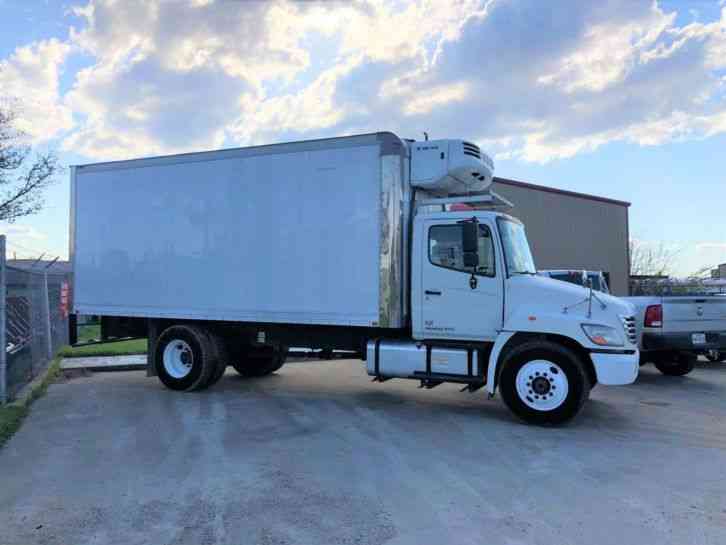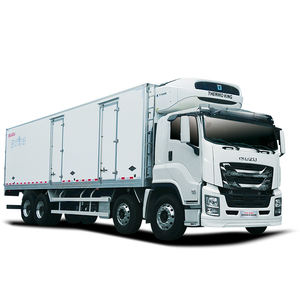Refrigerated Transportation Thermo King: The Ultimate Remedy
Refrigerated Transportation Thermo King: The Ultimate Remedy
Blog Article
Top Advancements in Transportation Refrigeration: Enhancing Efficiency and Security
The landscape of transportation refrigeration is going through significant makeover, driven by developments intended at boosting both performance and safety and security. As these developments continue to develop, it is essential to explore their effects on operational techniques and regulative conformity, prompting a closer assessment of just how they reshape the future of transport refrigeration.
Smart Temperature Monitoring Systems
In the realm of transport refrigeration, wise temperature level surveillance systems have become an important technology for ensuring the integrity of temperature-sensitive goods. These sophisticated systems leverage Internet of Things (IoT) modern technology to give real-time information on temperature level changes, enabling operators to keep optimal conditions throughout the supply chain. By continually tracking the temperature level of cooled containers and cars, companies can swiftly determine discrepancies that might endanger item high quality.

Additionally, smart tracking systems frequently integrate automated notifies and notices, enabling stakeholders to respond quickly to any type of possible concerns. This positive technique not just lessens the risk of putridity but also boosts conformity with regulatory standards controling food security and pharmaceutical transport.
The combination of data analytics within these systems likewise helps with predictive maintenance, helping drivers to predict possible devices failures prior to they take place. This capability lowers downtime and optimizes functional efficiency, ultimately resulting in set you back financial savings.
Eco-Friendly Refrigerants
Smart temperature level tracking systems play an essential function in preserving item high quality, however the efficiency of transportation refrigeration also rests on the selection of cooling agents made use of. As ecological issues increase, the change towards eco-friendly cooling agents has come to be essential. Conventional refrigerants, such as hydrofluorocarbons (HFCs), are infamous for their high Worldwide Warming Potential (GWP), contributing substantially to environment modification. In contrast, emerging choices like hydrocarbon-based cooling agents and hydrofluoroolefins (HFOs) present reduced GWP alternatives, offering both effectiveness and sustainability.
These eco-friendly cooling agents not only lessen environmental impact yet also align with worldwide guidelines targeted at eliminating dangerous materials. Their adoption can result in improved power effectiveness, eventually decreasing operating expense for transportation refrigeration systems. The usage of natural cooling agents, such as ammonia and carbon dioxide, has gotten grip due to their exceptional thermodynamic properties and lower environmental footprint.
Spending in environment-friendly refrigerants is not simply a regulatory conformity step; it represents a strategic decision that enhances brand online reputation and promotes client loyalty. thermo king truck refrigeration units. By prioritizing sustainable methods, companies can contribute to a greener future while making certain the integrity of carried items
Advanced Insulation Products
Making use of innovative insulation products is essential for enhancing transport refrigeration systems, as they substantially boost energy effectiveness and maintain consistent temperature control. Typical insulation techniques typically fall brief in avoiding thermal transfer, leading to boosted power usage and changing temperatures within refrigerated areas.
Arising products such as vacuum protected panels (VIPs) and aerogels supply superior thermal resistance, enabling thinner accounts without endangering efficiency. VIPs, for example, make use of a vacuum layer to minimize convective and conductive warmth transfer, making them optimal for space-constrained applications. Aerogels, recognized for their lightweight and permeable structure, supply phenomenal insulation while substantially decreasing overall system weight.
In addition, incorporating phase adjustment materials (PCMs) right into insulation systems can additionally stabilize temperature levels throughout transit. These materials take in and release thermal energy, successfully buffering against outside temperature variations.
The assimilation of these innovative insulation materials not just lowers the operational prices connected with energy consumption however also expands the life span of temperature-sensitive items. As the their website transportation refrigeration market continues to evolve, the fostering of ingenious insulation technologies will certainly be critical in improving both performance and safety in chilled transportation.
Automated Course Optimization
The efficiency of transportation refrigeration systems is greatly boosted through automated course optimization, which leverages real-time data and innovative algorithms to figure out the most effective courses for shipment. By analyzing numerous variables such as traffic patterns, climate condition, and shipment windows, these systems can dramatically decrease traveling time and fuel usage.
Automated route optimization lessens human error and subjective decision-making, which can bring about inefficiencies. This technology makes it possible for fleet managers to assign resources much more properly, making certain that refrigerated items maintain their called for temperature level throughout the journey. By enhancing routes, business can likewise improve customer satisfaction via prompt deliveries.
In addition, automated systems can adapt to unpredicted situations, such as roadway closures or unexpected website traffic spikes, permitting dynamic rerouting. This flexibility not just protects the integrity of temperature-sensitive items but also contributes to overall functional efficiency.
Implementing automated route optimization can cause substantial cost financial savings while lowering the carbon impact associated with transportation. As organizations increasingly prioritize sustainability, this development stands apart as an important element in contemporary transport refrigeration, lining up operational goals with environmental obligation. Ultimately, automated route optimization represents a considerable development in the quest for effectiveness and safety in transportation refrigeration.

Real-Time Data Analytics
Automated path optimization significantly gain from the assimilation of real-time data analytics, which provides vital understandings right into the performance of transport refrigeration systems. By utilizing real-time data, transportation drivers can monitor temperature level variations and equipment performance, making sure that disposable products are kept within required specifications throughout transportation. This proactive technique not just improves the high quality of the carried products but likewise mitigates the risk of wasting and loss.

Along with boosting effectiveness, real-time analytics improves safety by making certain conformity with regulative standards for temperature level control. This not only secures public wellness but additionally fortifies a firm's track record - thermo king truck refrigeration units. As the transportation refrigeration sector progresses, the integration of real-time information analytics emerges as a visit here keystone for driving technology, sustainability, and operational excellence
Conclusion
Finally, the innovations in transport refrigeration dramatically improve both efficiency and security within the industry. Smart temperature level monitoring systems and real-time information analytics provide vital oversight, while environmentally friendly cooling agents and advanced insulation products add to sustainability and energy performance. Furthermore, automated path optimization formulas not only minimize travel time however additionally minimize ecological influence. Jointly, these advancements stand for a vital advancement in transport refrigeration, guaranteeing conformity with governing standards and promoting a greener future.
The landscape of transportation refrigeration is undergoing significant transformation, driven by developments aimed at improving both effectiveness and security.Smart temperature monitoring systems play an important role in maintaining product quality, but the effectiveness of transport refrigeration additionally pivots on the selection of cooling agents utilized. Their adoption can lead to improved energy efficiency, inevitably lowering operating costs for transport refrigeration systems. Eventually, automated course optimization represents a substantial advancement in the pursuit for efficiency and safety and security in transportation refrigeration.
In final thought, the developments in transport refrigeration significantly boost both effectiveness and safety and security within the market.
Report this page